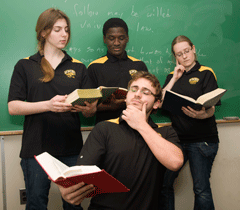Value Judgments
On March 3, four philosophy students will become UMBC’s first Ethics Bowl team to compete in the national Ethics Bowl tournament. The National Ethics Bowl will be held in Cincinnati, Ohio as part of the Association for Practical and Professional Ethics’ 20th anniversary meeting.
Although UMBC has previously participated in mock ethics bowls, this is the first year that the university has supported a registered team. The team placed third out of 16 in the Mid-Atlantic regional tournament, which was held on November 20.
An ethics bowl is structured similarly to a debate tournament. However, rather than being judged on whether their position is convincing, teams are judged on their ability to think through the moral implications of their possible decisions. The 40 teams invited to the National Ethics Bowl, who represent the top four teams from each of the 10 regional ethics bowls, were given 15 ethical issues to research. They will not know the specific question they have to answer until the day of the tournament.
“There’s excitement in having to think on your feet and find that loophole in your opponent’s argument. By the end you learn so much critical thinking-wise,” said Kayla Smith ’12, biological sciences and philosophy.
The ethics bowl team has met with Greg Ealick ’89, philosophy, and adjunct professor of philosophy, twice a week since the beginning of the semester to discuss the issues. The group has discussed moral dilemmas ranging from advertisements targeted towards children to alcoholic drinks enhanced with caffeine, from “Don’t Ask, Don’t Tell” to hybrid animals.
In order to prepare, the group learned to look at the issues from all sides and consider the repercussions of potential decisions. For example, for a case on punishments for violating a school’s academic integrity policy, the students thought about how their possible position might affect the student, their classmates, their professor, the university and their future employers.
“The first time you see a case you see it from a certain perspective, but when you take the time to discuss it you start to see things about it that you didn’t see before,” said Nana Owusu-Boaitey ’11, philosophy and biological sciences.
Danielle Albrecht ’13, philosophy and political science, agrees. “It’s only when we come here and discuss the problems as a group that all these different ideas start to come out and we see all these different possibilities. That’s part of what makes it so exciting, and what makes it really relevant,” she said.
The ethics bowl team members agreed that what they’ve learned preparing for the ethics bowl is applicable to their life outside the tournament as well. They cite the fact that they’ve learned to look at a problem from multiple angles and think quickly on their feet. “It helps you communicate with people who might disagree with you and it helps you to get your point across,” said Smith.
It’s also, the team said, made them trust their own thoughtful opinions. “It’s pretty confidence-boosting to present a viewpoint and know that you had some great arguments and made some great points,” said Michael Iafolla ’11, philosophy and English.
Still not sure what the ethics bowl team does? Watch this video of the team practicing.
(2/25/11)

